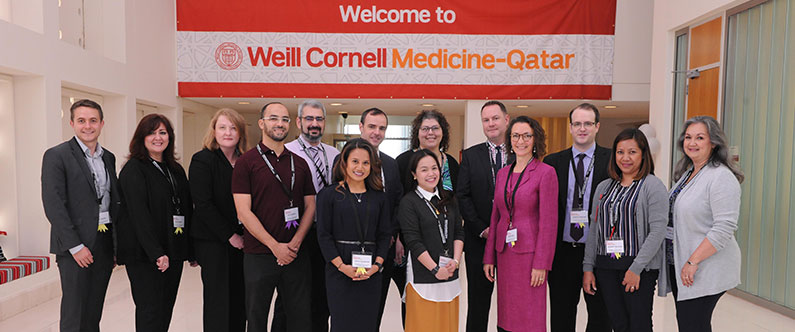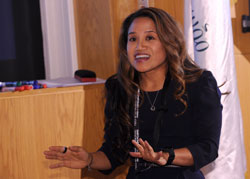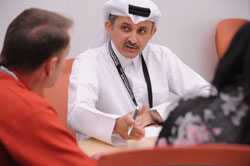New CSSL hosts its inaugural symposium on simulation-based learning
 The symposium, led by WCM-Q, featured contributions from Hamad Medical Corporation, College of the North Atlantic - Qatar, Sidra Medical and Research Center, Qatar University College of Pharmacy, University of Calgary in Qatar, the Center for Medical Simulation in Boston, and WCM-Q.
The symposium, led by WCM-Q, featured contributions from Hamad Medical Corporation, College of the North Atlantic - Qatar, Sidra Medical and Research Center, Qatar University College of Pharmacy, University of Calgary in Qatar, the Center for Medical Simulation in Boston, and WCM-Q.
Methodologies and educational opportunities where simulation-based learning can optimize health professions education were discussed at the first symposium to be held in WCM-Q’s newly launched Clinical Skills and Simulation Lab (CSSL).

The one-day symposium featured a series of panel discussions and interactive workshops which drew upon the array of simulation-based expertise that currently exists for health professions education in Qatar. The event, led by WCM-Q, brought together speakers from Hamad Medical Corporation, College of the North Atlantic - Qatar, Sidra Medical and Research Center, Qatar University College of Pharmacy, University of Calgary in Qatar, WCM-Q and the Center for Medical Simulation in Boston.
Seventy-seven healthcare educators attended the Optimizing Health Professions Education with Simulation-Based Learning symposium where they learned how to design scenarios for simulation-based education (SBE), discussed different methods of assessment and, through engaging with a simulation scenario, understood how SBE can help identify learners’ skills and knowledge gaps. They then practiced structured debriefing to help the learners reflect on their actions and begin to address these gaps.
Dr. Janice Palaganas, from the Center for Medical Simulation, led the keynote address and illustrated the effectiveness of simulation and debriefing as key elements that can enhance interprofessional education (IPE) and thereby support safer patient care in practice.

Previously known as the Clinical Skills Center, the CSSL recently underwent a major program of refurbishment, expansion and modernization in line with WCM-Q’s commitment to continuously improve the quality of its medical education. The facility has expanded from 8,500 to 10,500 square feet and is now equipped with a new and improved high-definition audiovisual system, state-of-the-art human patient simulators able to simulate many different medical conditions and a variety of other hi-tech learning aids. The number of clinical examination rooms has been increased from six to 12.
Dr. Stella Major, symposium course director and director of the CSSL, said: “We are very happy to have hosted our first symposium in our expanded and enhanced CSSL, which is already proving to be an extremely effective learning space. Our aim with the CSSL is not only to give our students the very best medical education possible, but also to serve as a center of excellence to facilitate the spread of simulation-based learning throughout the healthcare community, for the benefit of students, educators and patients alike.”